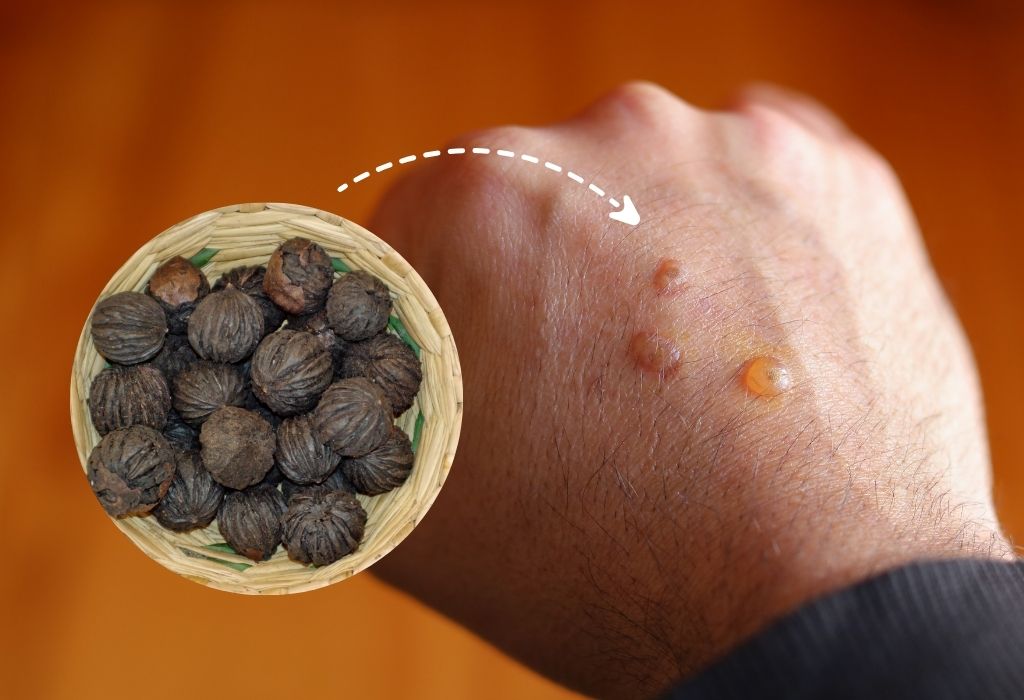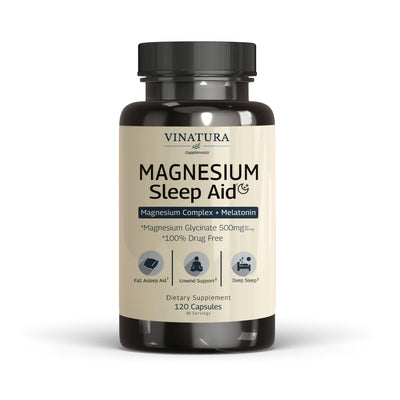
Can Black Walnuts Cause Blistered Hands?
Black Walnut offers several potential health benefits, but it is important to be cautious when using it to avoid skin irritation. If you're wondering, "Can Black Walnut cause blisters on your hands?", the answer is yes.
Black Walnut contains a natural substance called juglone, which can irritate the skin. Direct contact with the husk or other parts of the tree may lead to skin discomfort, including blisters. This article guides how to use and store Black walnuts safely.
Before exploring further, please read the disclaimer located at the end of this webpage.
Key Takeaways
- Black Walnut may cause skin irritation, including blisters: The juglone in the husk can irritate the skin.
- Other potential effects: It may cause stomach discomfort, nausea, or skin irritation in some individuals.
- Safe usage: Peel the husk, allow the nuts to dry, and store them properly. You can also use them in capsule, powder, or extract form for convenience.
Can Black Walnuts Cause Blistered Hands?

Yes, Black walnuts can not only stain your hands but also cause blisters. This is due to the presence of a toxin called juglone, which can harm the skin if you come into contact with it [1]. Initially, you may feel pain and itching, and it can gradually worsen into severe blisters. For those with sensitive skin, even a small touch is enough to cause skin damage.
How Do Black Walnuts Cause Blisters On Hands?
As mentioned earlier, the toxin in Black Walnut is juglone – a natural compound in the husk of the walnut that has strong irritant properties that can cause blisters on the hands.
Juglone acts like a strong chemical, damaging the surface skin cells and leading to irritation or inflammation. This reaction is not an allergy but rather a contact irritation that can affect anyone who touches it, not just those with sensitive skin. Therefore, when handling Black walnuts, wearing gloves is the best way to protect your hands from damage.
Other Side Effects Of Black Walnut
Black Walnut not only affects plants but can also cause some side effects in humans and animals. In nature, Black Walnut releases a substance called juglone, which can harm sensitive plants like tomatoes, potatoes, and flowers such as peonies, causing them to wilt and even die if planted too close. For animals, especially horses, exposure to Black Walnut sawdust can lead to hoof inflammation.
Consuming Black walnuts in excess may lead to digestive discomfort in some individuals. If any discomfort occurs, it's recommended to reduce consumption and consult a healthcare provider. If discomfort continues or worsens, it’s always a good idea to check with a healthcare professional.
Additionally, direct contact with Black walnuts can cause skin irritation, rashes, or natural swelling. Furthermore, sawdust or pollen from the tree can irritate those prone to respiratory sensitivities [2].
What To Do If Black Walnuts Cause Blisters On Hands?

If contact with Black Walnut leads to irritation, gently wash the affected area with soap and water to remove the juglone substance.
For small blisters, it’s best to let them heal on their own. However, if the blisters are large and painful, it’s best to consult a doctor for safe treatment. For skin irritation, some people find over-the-counter remedies helpful, but if irritation persists, consult with a healthcare provider for guidance. In more severe cases, a doctor may prescribe a stronger steroid cream.
If the blister breaks, apply antibiotic ointment and a light bandage to prevent infection and aid the healing process. When handling Black walnuts in the future, wearing protective gloves is the best way to avoid skin irritation. If signs of infection such as redness, natural swelling, fever, or pain appear, seek medical attention for a thorough examination [1].
Black Walnuts Benefits

Here are some of the benefits of Black Walnuts:
- High plant protein content: Black Walnuts are an excellent choice, offering 15g of protein per half cup, the highest among nuts [3].
- Improves cardiovascular and digestive health: Studies show that consuming 42g of Black Walnuts daily increases beneficial bacteria in the gut and reduces inflammatory bile acids. Additionally, it lowers healthy LDL cholesterol levels that are already within the normal range, and some indicators are associated with cardiovascular risk [4].
- Rich in beneficial omega-3s: This nut contains alpha-linolenic acid, an essential omega-3 fatty acid that supports heart health and brain function and reduces inflammation, something the body cannot produce on its own [3].
- Pleasant flavor, ideal for cooking: Black Walnuts have a richer, bolder taste compared to other walnuts, adding a unique touch to baked goods, salads, and stir-fries.
- Easy to store for long periods: Due to their high oil content, the nuts can maintain freshness in the fridge for 9-12 months or even up to 2 years in the freezer [3].
- Easy to incorporate into recipes: Black Walnuts can replace other nuts, making it easy to add them to recipes for bread, cookies, and even ice cream while retaining nutritional value and great flavor.
How to Harvest Black Walnut Safely
Because there is a risk of blisters when handling black walnuts directly, you should keep the following tips in mind to protect your hands:
- Wear protective gloves: Disposable gloves are the best option to avoid contact with juglone, a substance that can cause irritation and leave dark stains. If you use rubber gloves, make sure to wash them thoroughly after use.
- Avoid touching your face and other surfaces: Minimize touching your face, especially your eyes and mouth, and do not let your hands touch surfaces you will touch later. Clean all work surfaces with paper towels and soap.
- Wash your hands immediately after harvesting: If you accidentally touch the walnut husk, wash your hands thoroughly to prevent stains from lasting.
- Treat promptly if itching or blistering occurs: Use hydrocortisone cream to relieve itching, or consult a doctor if necessary.
- Wear long sleeves and pants: This helps protect your skin from direct contact with the toxic substance.

Way To Consume Black Walnuts Safely
To use Black Walnuts safely, after harvesting, peel off the green husk and let the nuts dry in a cool, dry place for a few weeks.
Before using, check for any moldy nuts, as this mold may contain harmful aflatoxins. Once dried, you can store the nuts in a mesh or cloth bag in a dry place or remove the husk and refrigerate them for a longer shelf life. Black Walnuts are delicious in baked goods, salads, or stir-fries, giving you many ways to enjoy them!
For quick and convenient use, many people turn to Black Walnut supplements. Common supplement forms include capsules, powder, and extract. Each form has its pros and cons:
- Capsules: These are the most convenient and easy to use. You only need to take 1-2 capsules per day and wait for the effects. They also allow for easier dosage control.
- Extracts: Usually in liquid or concentrated form, extracts are quickly absorbed by the body and can be added to drinks or food. They’re ideal for those who prefer not to take capsules and want more flexibility.
- Powder: This form is versatile for mixing and can be added to smoothies, juices, or meals. It’s suitable for those who want to fully utilize the natural ingredients of the product.
Frequently Asked Questions
Can Black Walnuts Irritate Skin?
Yes, Black Walnuts can cause skin irritation due to the juglone in its husk. This toxin can make your skin itchy, burn, and even blister. The symptoms may subside after a short time, but if they worsen or persist, you should consult a healthcare professional immediately [1].
Do Black Walnuts Stain Your Hands?
Yes, Black walnuts can stain your hands. Because of its juglone content, this substance creates dark stains similar to henna, which are difficult to wash off. Therefore, you should be cautious when handling Black walnuts, and it’s best to wear gloves to protect your skin.
Can You Be Allergic To Black Walnuts?
Yes, you can be allergic to Black walnuts. Allergies are primarily caused by pollen, wood, and fruit from the Black Walnut tree. Symptoms can include itching, hives, difficulty breathing, or natural swelling and blisters.
What Are The Side Effects Of Black Walnuts?
Side effects of Black Walnut can include abdominal pain, nausea, diarrhea, itching, rashes, and skin irritation. If you consume too much, it can harm your body. The safe dosage for Black Walnut is approximately 30-60g per day [5].
Conclusion
In conclusion, regarding the question "Can Black Walnut Cause Blistered Hands?" the answer is yes, but you can take precautions by wearing protective gloves when handling or coming into contact with the tree. If your skin blisters, wash it immediately and care for the affected area. Be sure to equip yourself with the necessary knowledge before using Black Walnut.
References
- [1] Clinic C. Why Black Walnuts Can Cause Your Hands to Be Stained and Blistered — and How to Find Relief. Cleveland Clinic. Published November 2, 2020. Accessed November 8, 2024. https://health.clevelandclinic.org/why-black-walnuts-can-cause-your-hands-to-be-stained-and-blistered-and-how-to-find-relief
- [2] Black Walnut Toxicity. Wisconsin Horticulture. Published 2024. Accessed November 8, 2024. https://hort.extension.wisc.edu/articles/black-walnut-toxicity/
- [3] A tough nut to crack: Unlock the healthy benefits of black walnuts. Illinois Extension. Published October 28, 2021. Accessed November 8, 2024. https://extension.illinois.edu/blogs/live-well-eat-well/2021-10-28-tough-nut-crack-unlock-healthy-benefits-black-walnuts
- [4] Holscher HD, Guetterman HM, Swanson KS, et al. Walnut Consumption Alters the Gastrointestinal Microbiota, Microbially Derived Secondary Bile Acids, and Health Markers in Healthy Adults: A Randomized Controlled Trial. Journal of Nutrition. 2018;148(6):861-867. doi:https://doi.org/10.1093/jn/nxy004
- [5] https://www.facebook.com/Drugscom. Walnut Uses, Benefits & Dosage Herbal Database. Drugs.com. Published 2022. Accessed November 8, 2024. https://www.drugs.com/npp/black-walnut.html
Author

Product Disclaimer
The dietary supplement products mentioned on this website are formulated based on scientific research and adhere to FDA guidelines for dietary supplements. However, the content of the articles has not been evaluated by the Food and Drug Administration (FDA) and is not intended to promote or endorse any specific product. Any products sold on this website are not intended to diagnose, treat, cure, or prevent any disease.
Opinions and Endorsements
Any claims, statements, or opinions expressed in the articles are those of the author(s) and do not necessarily reflect the views or opinions of the manufacturers of the dietary supplement products. The products sold on this website are separate from the content of the articles and are not directly endorsed or associated with the information presented here.
Liability Disclaimer
The author(s) of the articles, website, and manufacturers of the dietary supplement products do not assume any liability for any potential consequences arising from the use of the information provided in the articles. It is recommended that individuals consult with a qualified healthcare professional before making any dietary or lifestyle changes, including the use of dietary supplements.
Product Usage
Please refer to the product labels and packaging for specific usage instructions and guidelines for the dietary supplement products sold on this website.
Customer Support
For any concerns or questions regarding the dietary supplement products, please contact our customer support team, who will be more than happy to assist you.





Leave a Comment
Be the first to comment.
What do you think?